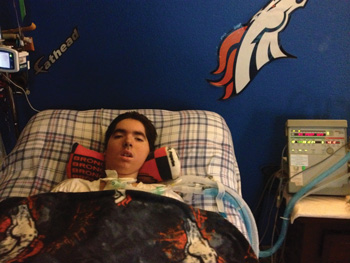One minute can make a
difference
By Catherine
Blakemore
 |
| Blakemore |
When Pablo Carranza turned
21, he received an unwelcome present. The state reduced the hours of critical home-based
nursing care he could receive simply because he became an adult. Pablo has
muscular dystrophy and cannot breathe or swallow on his own. Because of his
disability, the state has provided him one-to-one care since he was 14, which
includes monitoring his ventilator and feeding tube and clearing fluid from his
lungs and tracheotomy tube. Though he can only move his eyes, tongue and left
thumb, Pablo is a fighter who graduated from high school and has now begun
community college. Pablo refuses to let his disability limit him, and says, “To
live…in an institution would be no different from spending the rest of my life
in prison.” But fighting to avoid institutionalization is not something he can
do alone.
 |
| Pablo Carranza |
Seniors, veterans,
foster youth and Californians with disabilities fall through cracks in the
social safety net each day. Luckily, legal aid lawyers are there to catch them.
Each day, legal aid attorneys help families keep their homes, ensure access to healthcare for
people with disabilities, and help domestic violence survivors navigate the
court system and provide a safe home for their children. But for every person who
receives assistance from a legal aid lawyer, four more are left to fight alone
because there are not enough resources to help them.
For many years, the
State Bar of California’s Legal Services Trust Fund Program (LSTFP) has been a
bulwark in ensuring that people like Pablo have access to the legal assistance
they need by providing grants to legal aid organizations throughout California.
Unfortunately, LSTFP funding is now at unprecedented risk due to plummeting
interest rates. Since 2000, the fund has distributed, on average, about $11
million per year in IOLTA (Interest on Lawyers’ Trust Accounts) grants for the
provision of free civil legal assistance to indigent Californians. At its peak
in 2008, IOLTA revenue contributed $22.8 million to legal aid, but in 2013,
California’s IOLTA revenue was less than $5 million, slashing the amount
available for distribution to legal services. That is less than 70 cents for
each person who qualifies for free legal assistance. In addition, the same
financial crisis that caused the precipitous drop in IOLTA revenue since 2008
also created unprecedented need for legal services. California’s poverty
population has grown by almost 700,000 people since 2000, while IOLTA revenue
has dropped more than 75 percent from its peak.
To help
bridge the gap in funding, last year the Justice Gap Fund raised more than
$900,000, but that is less than 5 percent of the funds needed to restore IOLTA funding
to 2008 levels. Similarly, fewer than 5 percent of California’s lawyers
contribute to the fund, even though the State Bar makes it easy for them to
contribute directly through their annual fee statement. Donations to the Justice Gap fund make a significant impact on
the ability of nonprofit legal aid organizations to provide access to justice,
and help to ensure that the hundreds of thousands of clients like Pablo will
have access to a legal aid lawyer when they have nowhere else to turn.
Luckily, legal aid
attorneys at Disability Rights California were able to help Pablo — and
thousands more Californians facing a similar fate — fight for and win the care
needed to live a full life. As a result, Pablo continues to receive nursing
care at home at less cost to the state than if he were institutionalized. But
not everyone who needs legal assistance is that lucky. In less than a minute,
you can contribute online through the Campaign for Justice website and help people like Pablo fight to secure what they need to
be healthy, safe and happy.
Catherine Blakemore is the executive director of Disability Rights
California and a member of the California Commission on Access to Justice.